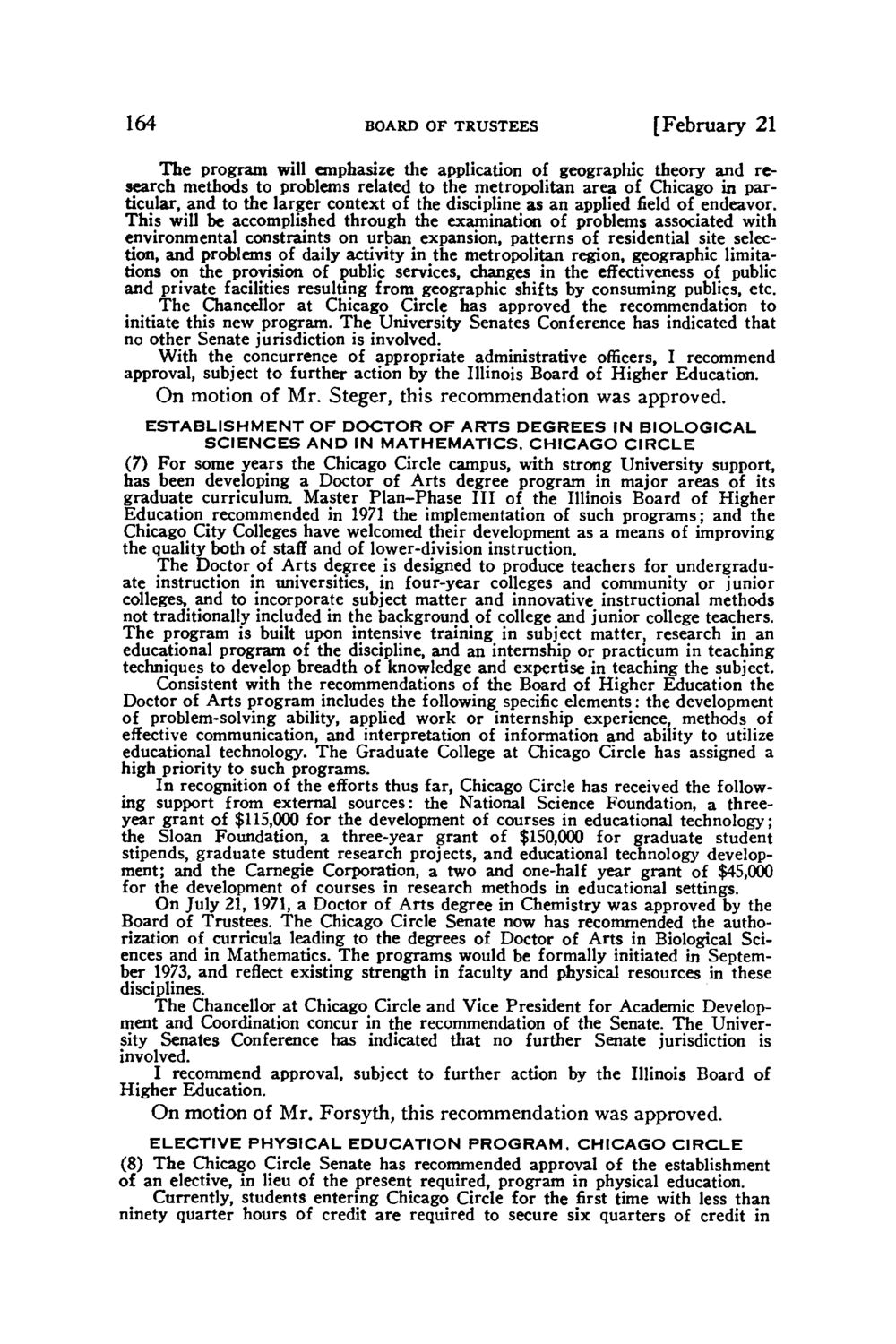| |
| |
Caption: Board of Trustees Minutes - 1974 Version B
This is a reduced-resolution page image for fast online browsing.

EXTRACTED TEXT FROM PAGE:
164 BOARD OF TRUSTEES [February 21 The program will emphasize the application of geographic theory and research methods to problems related to the metropolitan area of Chicago in particular, and to the larger context of the discipline as an applied field of endeavor. This will be accomplished through the examination of problems associated with environmental constraints on urban expansion, patterns of residential site selection, and problems of daily activity in the metropolitan region, geographic limitations on the provision of public services, changes in the effectiveness of public and private facilities resulting from^ geographic shifts by consuming publics, etc. The Chancellor at Chicago Circle has approved the recommendation to initiate this new program. The University Senates Conference has indicated that no other Senate jurisdiction is involved. With the concurrence of appropriate administrative officers, I recommend approval, subject to further action by the Illinois Board of Higher Education. O n motion of M r . Steger, this recommendation was approved. ESTABLISHMENT OF DOCTOR OF ARTS DEGREES IN BIOLOGICAL SCIENCES AND IN MATHEMATICS. CHICAGO CIRCLE (7) For some years the Chicago Circle campus, with strong University support, has been developing a Doctor of Arts degree program in major areas of its graduate curriculum. Master Plan-Phase III of the Illinois Board of Higher Education recommended in 1971 the implementation of such programs; and the Chicago City Colleges have welcomed their development as a means of improving the quality both of staff and of lower-division instruction. The Doctorof Arts degree is designed to produce teachers for undergraduate instruction in universities, in four-year colleges and community or junior colleges, and to incorporate subject matter and innovative instructional methods not traditionally included in the backgroundof college and junior college teachers. The program is built upon intensive training in subject matter, research in an educational program of the discipline, and an internship or practicum in teaching techniques to develop breadth of knowledge and expertise in teaching the subject. Consistent with the recommendations of the Board of Higher Education the Doctor of Arts program includes the following specific elements: the development of problem-solving ability, applied work or internship experience, methods of effective communication, and interpretation of information and ability to utilize educational technology. The Graduate College at Chicago Circle has assigned a high priority to such programs. In recognition of the efforts thus far, Chicago Circle has received the following support from external sources: the National Science Foundation, a threeyear grant of $115,000 for the development of courses in educational technology; the Sloan Foundation, a three-year grant of $150,000 for graduate student stipends, graduate student research projects, and educational technology development; and the Carnegie Corporation, a two and one-half year grant of $45,000 for the development of courses in research methods in educational settings. On July 21, 1971, a Doctor of Arts degree in Chemistry was approved by the Board of Trustees. The Chicago Circle Senate now has recommended the authorization of curricula leading to the degrees of Doctor of Arts in Biological Sciences and in Mathematics.^ The programs would be formally initiated in September 1973, and reflect existing strength in faculty and physical resources in these disciplines. The Chancellor at Chicago Circle and Vice President for Academic Development and Coordination concur in the recommendation of the Senate. The University Senates Conference has indicated that no further Senate jurisdiction is involved. I recommend approval, subject to further action by the Illinois Board of Higher Education. On motion of Mr. Forsyth, this recommendation was approved. ELECTIVE PHYSICAL EDUCATION PROGRAM, CHICAGO CIRCLE (8) The Chicago Circle Senate has recommended approval of the establishment of an elective, in lieu of the present required, program in physical education. Currently, students entering Chicago Circle for the first time with less than ninety quarter hours of credit are required to secure six quarters of credit in
| |